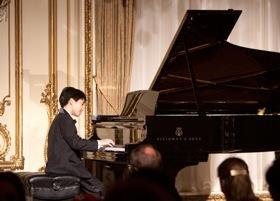What Do You Play, Sing, or Hum for the Holidays?
Continuing the seasonal feature from last week's column: The fun is not over yet. If you participate this week by e-mailing your brief responses, there will be one more partridge in the pear tree next Tuesday.
Jessica Wang, turned 8 on Dec. 10, piano student: "Old Saint Nicolas"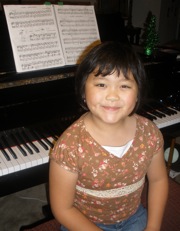
"I like it because of its beautiful melody and lyrics. Now I'm practicing it on piano and guitar, and going to perform it for my family on Christmas Eve."
Avery Kuo, 6, piano student: "O Christmas Tree"
"I like the music, and the tree makes me think of the Christmas gifts under the tree."
Marion Atherton, executive director, Piedmont East Bay Children's Choir:
"It's just not Christmas without the classic carols in the Anglican style! 'Once in Royal David's City,' 'The Cherry Tree Carol,' 'Hark the Herald Angels' of course, with the descant by David Willcocks."
Christopher Wang, 11, piano student:
March from Tchaikovsky's Nutcracker
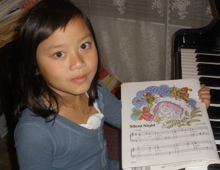
"I've learned it, playing it on piano when I was little, and have been playing it ever since. Love the energetic rhythm, especially when fanfares are repeated. Also, Tchaikovsky is my favorite composer."
Christiane Tran, piano student: "Silent Night"
"Because that's what I play at the Christmas recital this week."
Sara Garland, soprano, Adler Fellow: "O Holy Night"
"My father constantly says he wishes he could hear me sing more often, and since we are mostly together at the holidays, last Christmas I asked my church if I could sing 'O Holy Night' during the distribution of communion at Christmas Eve Mass. No one in my family knew that I would be singing. That afternoon, I wrote a note to my Dad and brought it with me to church. During the ‘sign of peace,’ I went to leave the pew and passed the note to my Dad. I gave him a big hug and whispered, 'Merry Christmas, Dad. This is my gift to you. I love you.' My Dad was bawling, and he still talks about how special that day was for him."
Melanie Guther, Crowden School 8th grader: "Holiday in Cambodia," by the Dead Kennedys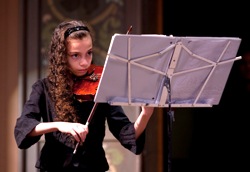
"It makes me happy and puts me in the mood for holiday cheer."
Patty Murray, WomenSing chorus member: Vaughan Williams' "Fantasia on Christmas"
"These carols for mixed chorus, with lovely original old English holiday texts and familiar English folk tunes, feel majestic and completely in the spirit of the season."
Lily Lahrs, Crowden School 5th grader: "Carol of the Bells"
"I’ve always loved this song — it has a great tune, great words, and you get a good feeling listening to it."
Pacific Centennial Showcase
Pacific Musical Society's big 100th birthday bash at the Fairmont Hotel Saturday night not only raised a substantial sum for the organization — and thereby for young musicians — but also provided a hit parade of current and former winners.
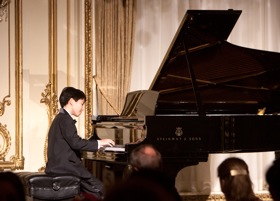
Photos by Kyle Chesser
Along with guest stars Frederica von Stade and Jake Heggie, a pair of 10-year-old competition winners dazzled. Pianist Elliot Wuu's self-confident, effortless Mozart (the charming "Twinkle Twinkle Little Star" variations, which turns into something substantial and virtuosic), and Kevin Zhu's performance of the Bruch Violin Concerto No. 1 Finale, were both memorable. Providing the orchestral accompaniment to the violin concerto on piano was Zhu's sister, Alice — another extraordinary teen talent.
Among performing alumni: pianists Ruth Slenczynska — who received her Pacific award back in the days of fellow youngsters Yehudi Menuhin, Ruggiero Ricci, and Leon Fleisher — and David Ko (with Liszt's Rhapsodie espagnole), cellist Matt Haimovitz (Saraband and Gigue from Bach's Suite No. 3 for Cello).
Haimovitz, Heggie, and soprano Lisa Delan joined in the performance of "In Going From a World We Know," the very best of Gordon Getty's White Election, a cycle of 32 songs on poems by Emily Dickinson. (Heard on the way to the event on Prairie Home Companion: Saturday was the 180th anniversary of Dickinson's birth.)
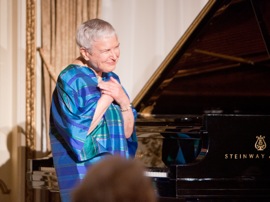
The winner of the 2010 voice competition, mezzo Evgenia Chaverdova, sang songs by Rachmaninov and Fauré, then did a brave thing and did it well: she performed "Non so piu cosa" from The Marriage of Figaro, singing Cherubino's aria to an audience including Flicka (von Stade), one of the defining performers of the role.
The text says, "I don't know any more what I am, what I'm doing," but Chaverdova knew and did exactly what was right, and the senior Cherubino applauded her heartily.
Chaverdova's accompanist was James Meredith, a society vice president who — with president Halim Habiby — was the main organizer of the event, and the MC.
Flicka's set, accompanied by Heggie, included the composer's "A Route to the Sky," plus an eclectic collection of songs by Rorem, Guglielmi, Puccini, Carol Hall, and Bernstein.
The finale had a group of the artists performing Heggie's "My True Love Hath My Heart" and then — mindful of the calendar — "Silent Night."
One of the items in the silent auction (which raised $10,000, in addition to the gala income) was Slenczynska giving a private master class for four students in Saratoga. The Sacramento-born pianist, turning 86 in January, made her Berlin debut at age 6, quit at age 15 because of the stress of touring (her autobiography is called Forbidden Childhood), later attended UC-Berkeley, and eventually resumed her career. She is the only one left of the generation of pianists who had direct contact with Rachmaninov and other giants of the early 20th century.
Conductors Converging on the City
The 2011 Annual Conference for Conductors will be held in San Francisco Jan. 6-9, in the War Memorial and Performing Arts Center's Green Room. Good luck to their hearing each other, not to mention performances, in that acoustically inferior venue.
The Conductors Guild calls itself "the only music service organization devoted exclusively to the advancement of the art of conducting and to serving the artistic and professional needs of conductors." There are 1,600 members, representing all 50 United States and more than 30 countries.
Featured speakers at the convention include Kirill Karabits, guest conductor for the San Francisco Symphony's Jan. 6-5 concerts; Oakland East Bay Symphony Music Director Michael Morgan; S.F. Symphony Chorus Director Emeritus Vance George; and S.F. Ballet Orchestra Music Director Martin West.
On Jan. 8, there will be a concertmasters' panel discussion, with Kay Stern (S.F. Opera Orchestra), Dan Flanagan (Sacramento Symphony), Terrie Baune (Oakland East Bay Symphony), Robin Mayforth (Symphony Silicon Valley), Robin Sharp (S.F. Chamber Orchestra), and Roy Malan (S.F. Ballet Orchestra and California Symphony).
Another topic of the conference is the New Music Project. Established in the 1980s, it is a presentational forum of sessions during which conductors share compositions, written within the past 10 to 15 years, that they have conducted and are advocating.
Adams on Adams
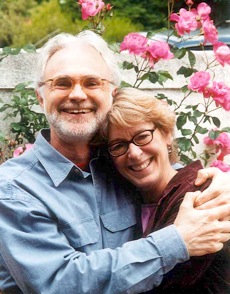
With all the joyful noise from and about the current John Adams residency at San Francisco Symphony, it's instructive to recall the composer's words about his relatively late-in-life interest in chamber music, and his transition from minimalism to ... the “Adams Sound.”
He was speaking at the Crowden School fund-raising concert in 1997 celebrating his 50th birthday:
My music of the '70s and '80s was principally about massed sonorities and the physical and emotional potency of big walls of triadic harmony. These musical gestures were not really germane to chamber music with its democratic parceling of roles, its transparency and timbral delicacy. Moreover, the challenge of writing melodically, something that chamber music demands above and beyond all else, was yet to be solved.Another point for Adams scholars of the future (or present): Shaker Loops, his most often performed work, which has been choreographed several times, is that it "even enjoyed a moment of cult status in the movie Barfly, an autobiographical account of the poet Charles Kukowsky's down-and-out days on L.A.'s Skid Row":Fortunately, a breakthrough in melodic writing came about during the writing of The Death of Klinghoffer, an opera whose subject and mood required a whole new appraisal of my musical language.
In a famous scene Bukowsky (Mickey Rourke), having been battered and bloodied by his drunken girlfriend (Faye Dunaway), holes up in a flophouse room, writing poems in a fit of inspiration to the accompaniment of the insistent buzz of "Shaking and Trembling."Peter Sellars, the MC for the birthday concert, summed up the feeling of all Friends of Adams: "He is going from maximal minimalism to a new phase, the masterpiece phase."
Moving forward from 1997 to 2011: The same Crowden Music Center that celebrated Adams back then will next year (March 12) honor his wife, with a gala fund-raiser called "Illuminations: Celebrating Deborah O'Grady." O’Grady, a photographer who has served on the Crowden Board of Trustees for a decade, has been instrumental in supporting the center’s educational programs, which will now also benefit from the gala in her honor.
Jonathan Moscone will be MC, while Helen Meyer and Philippa Kelly are cochairs of the honorary committee, which includes Michael Tilson Thomas, Gustavo Dudamel, and Kent Nagano.
And an additional "Adams Speaks of Adams" item from last week: In an item titled "Piloting the Aircraft Carrier" in his blog, the composer-conductor gives himself a passing grade in the latter capacity:
El Niño is big enough. And it is complex enough to keep a conductor feeling as if he or she were the coach of a Superbowl team with the whole world watching for the first fumble. ...Thursday’s opening night of El Niño ends up going pretty well. I am annoyed at times by the little blemishes in the ensemble that I know are the result of the bizarre stage layout, and I chide myself for perhaps not keeping my hands high enough and sufficiently visible for some player who's struggling to see.
There are video monitors all over the stage for players to follow me, but even with that, the fast moving passages with their fussy little hockets now and then go momentarily out of phase. I have to rely on a tiny monitor speaker right next to my left shoulder just in order to hear the violins and keyboards. The sound coming through that monitor is tinny and harsh, but I couldn’t hope to keep things together without it.
Ole! for Lo Clásico
Why are Yaelisa and her Caminos Flamencos presenting "Lo Clásico" this weekend, instead of something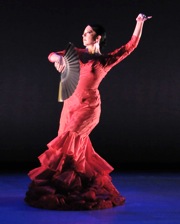 with "happy" or "merry" in it?
with "happy" or "merry" in it? Because, says the Emmy Award winner who is the founding artistic director of the flamenco company, "classic describes something which lives on, never goes out of style, and which can bring one to a nostalgic place. Our show this year is all of these things, with a few surprises thrown in."
The program, Dec. 17-19, in Cowell Theater, follows the troupe's production of Cancioñes and it will have plenty of happy and merry music — right after de Falla and after Ravel's Bolero, dances that are more on the fiery side.
Programs are also selected from the company's repertory of traditional Fandangos, Jerez-style Bulerias, Faure's Pavane and Yaelisa's signature Soleares.
"Lo Clásico" features music director Jason "El Rubio" McGuire; Jesus Montoya, a Gypsy singer from Sevilla; and Oscar Valero, a singer-dancer from Cordoba, Spain. Company soloists include Fanny Ara, Melissa Cruz, and Marina Elana, along with the 16-member corps de ballet.
Bells Are Ringing to Curb 108 Bonno
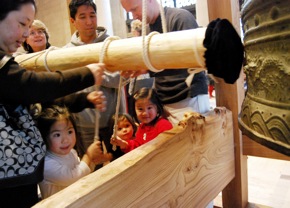
On Dec. 31, the Asian Art Museum will host — for the 25th time — the annual Japanese New Year's bell-ringing ceremony. A 2,100-pound, 16th-century bronze bell comes out from storage, to allow museum visitors to take turns tolling it 108 times.
According to Japanese custom, this welcomes the New Year and curbs the 108 bonno (mortal desires), which, according to Buddhist belief, torment humankind.
In an only-in-San Francisco angle, the Buddhist abbot who officiates the ceremony is the husband of Yoshi Akiba, owner of Yoshi's jazz clubs in San Francisco and Oakland.
After Japanese folk songs preceding the ceremony, Gengo Akiba Roshi will conduct a blessing and begin the bell ringing. Akiba Roshi is director of the Soto Zen Buddhism North American office, as well as a Zen teacher at Oakland's Kojin-an Zendo.
Numbered tickets to ring the bell are assigned to visitors in line in the South Court, beginning at 10 a.m., when the museum opens to the public. No advance reservations. There will be 108 groups of four to six people assembled to strike the bell.
Bad News from Sacramento, Honolulu
Sacramento Opera
Sacramento Opera, in its 28th year, is canceling the rest of its season, and laying off its staff except for the executive director.Season subscriptions fell 30 percent short of projections, "a body blow to a company that gets nearly two-thirds of its income from ticket sales," says the Sacramento Bee. "Opera leaders say their current business model will no longer work."
The cancellation of the season means that Michael Morgan's Sacramento Philharmonic, the pit orchestra for the Opera, will lose significant work and income.
Sacramento Opera had planned an adventurous season: The already performed Handel Orlando was this year's production, and the canceled 2011 part would have been The Magic Flute and the Northern California premiere of Stephen Paulus' The Postman Always Rings Twice.
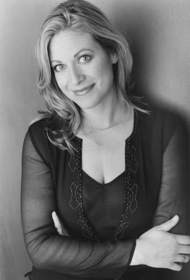
I don't believe casts were announced, but it's virtually certain the cancellation will hit Merolini/Adlers/young singers from San Francisco.
Honolulu Symphony
It was decades ago that, as a journalist in Hawaii, I wrote about the seemingly terminal illness of the Honolulu Symphony, once an amazingly good regional orchestra. It has taken decades of waiting for the final blow, but it is here now, Chapter 11 changed to Chapter 7 on Monday.The 110-year-old orchestra (born 11 years before the San Francisco Symphony) is being liquidated, leaving the state without a major symphonic organization. There remain several college and community orchestras, and Honolulu Symphony musicians will still get some gigs individually, playing for Nutcracker performances this month.
Unlike the Sacramento situation and the loss of the opera company, the Hawaii Opera Theater's Jan. 28 – March 1 season will provide some employment for the Symphony musicians. The season consists of Faust (with Melody Moore as Marguerite and Buffy Baggott as Siébel), Lucia di Lammermoor, and La traviata.
In other bad news, Detroit Symphony is trying to cope with an $8.8 million deficit as well as an ongoing musicians' strike. And strange things are even happening in Berlin.
Musicians of the Komische Oper there employ wildcat strikes: leaving in the intermission. The former East Berlin company still gets lower salaries than the West Berlin's Deutsche Oper, 20 years after reunification, so the musicians' demand for higher salaries is underscored by playing the equivalent of the “Farewell Symphony” at intermission. Shows continue with piano accompaniment.
The Staatskapelle in Daniel Barenboim's Staatsoper has the same persistent status predicament as Komische Oper, but the musicians are not striking because Barenboim has negotiated extra pay for them.
Puccini Prize to Luisotti
San Francisco Opera Music Director Nicola Luisotti was honored after leading the Metropolitan Opera performance of Puccini's The Girl of the Golden West on Dec. 10, the centenary of the work's world premiere there. (The San Francisco performances of the same production preceded the Met performances.)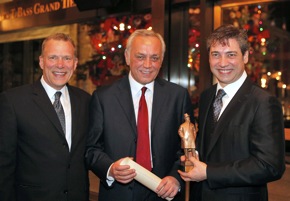
With both the Met's and SFO's general managers, Peter Gelb and David Gockley, attending the occasion, Paolo Spadaccini, president of the Fondazione Festival Pucciniano, presented the 39th Puccini Prize.
Previous winners include Luciano Pavarotti, José Carreras, Renata Scotto, Mirella Freni, Renata Tebaldi, Lorin Maazel, Bruno Bartoletti, Riccardo Muti ... and Woody Allen (in 2008, for directing L.A. Opera's Gianni Schicchi).
During the presentation, Spadaccini said Luisotti, "who began his career just meters away from Puccini's home theater, is an ambassador to the world for the music of Puccini."
Born in the Tuscan city of Viareggio, Luisotti has a special relationship with the Fondazione Festival Pucciniano. Luisotti can trace his earliest professional performances back to the Puccini Festival at Torre del Lago, where he sang in the chorus in 1984.
Luisotti leads eight performances of La fanciulla del West at the Met, including the final one on Jan. 8, which will be broadcast and telecast live in hi-def worldwide.
First San Francisco Flash Mob Opera
You saw it on YouTube from Sydney, Philadelphia, Budapest, and elsewhere — opera singers suddenly appearing in a train station or a shopping center, bursting out in arias, duets, choruses, and then leaving just as fast.
Festival Opera's Michael Morgan says singers from his company — Kaileen Miller, Christopher Jackson with members of the Festival Opera Chorus, directed by Brian Staufenbiel — invaded the San Francisco Ferry Building market three times on Saturday, with the "Brindisi" from La traviata, creating a West Coast precedence for flash mob opera. Take a look on You Tube.
Messiah in a Big Venue for a Small Price
Ticket prices for the American Bach Soloists' Messiah in Grace Cathedral range from $10 to $70. What the organization justifiably calls "affordable $10 tickets" are still available for Dec. 16 and 17. (There is another 10 percent discount for seniors and students.)
Conducted by ABS Music Director Jeffrey Thomas, performances feature Arianna Zukerman, Jennifer Lane, Wesley Rodgers, and James Maddalena.
The ABS program offers the final version of Handel’s Messiah as conducted by the composer himself in 1754. American Bach Choir joins the ABS period-instrument specialists.
NEA Grant to Merola Program
Rocco Landesman, chairman of the National Endowment for the Arts, announced last week that the Merola Opera Program has been recommended for a grant of $20,000 to support training of young opera artists. Merola is one of 1,057 not-for-profit organizations recommended for grants for fiscal year 2011. In total, the Arts Endowment will distribute $26.68 million to support projects nationwide."We are extremely honored that the NEA has recommended us as a grant recipient this year," says Merola Board President Patrick Wilken. "For more than 50 years Merola has changed the lives and careers of young opera artists and this grant will help us continue to offer a world-class training environment and ensure the future of this great art form."
Missing Michael Steinberg
There are many fine program annotators around (with S.F. Symphony's Larry Rothe right on top), but there was only one Michael Steinberg. I miss him every time I go to a concert, but especially when I encounter one of his old notes, which SFS uses frequently (and wisely).
To explain this dedication/nostalgia, consider just one brief passage — and that devilishly clever parenthesis about the diatonic-chromatic relationship — from Steinberg's note on John Adams' 1985 Harmonielehre and 1981 Harmonium:
About 1977, the year of his Phrygian Gates for piano, Adams’s musical language became "very pure," as he recalled in 1981, "almost rigorously pure in its modal, diatonic expression."("Diatonic" denotes a harmonic style based primarily on the notes of the major and minor scales; its opposite is "chromatic" — literally "colorful" — a style that draws freely on all twelve notes. "The Star-Spangled Banner" is diatonic, as is the Beethoven Fifth; the Prelude to Tristan is chromatic, and so are barbershop quartets.)
Harmonium, composed for the San Francisco Symphony in 1981, though still diatonic and essentially consonant, is looser in language than the works that preceded it. It has a quicker rate of harmonic change and more dramatic contrast. At the time he completed Harmonium, Adams described himself as "a minimalist who is bored with minimalism."

